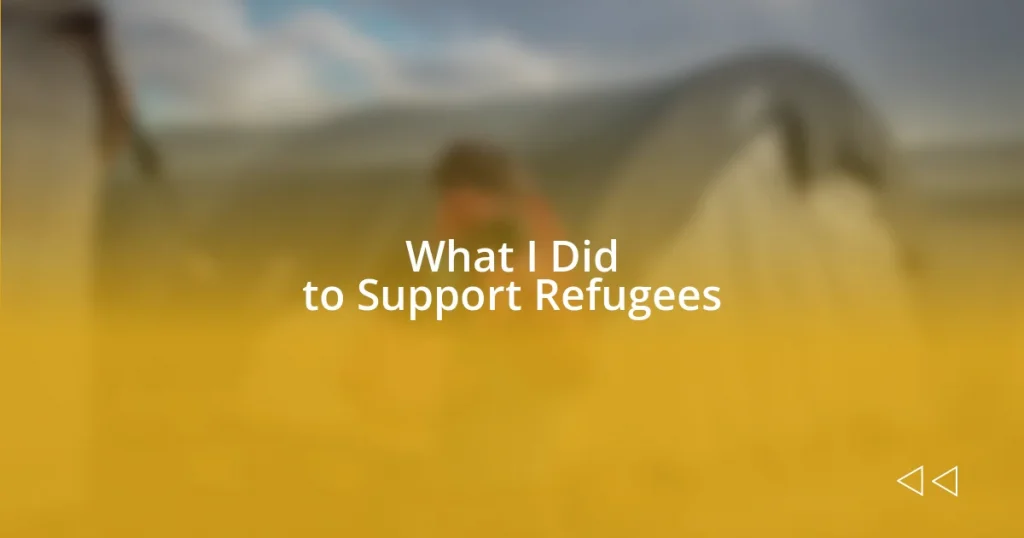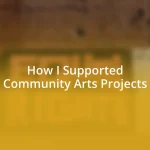Key takeaways:
- Understanding refugee needs involves addressing emotional struggles and promoting social integration for a sense of belonging.
- Volunteering, such as mentoring and organizing cultural exchange events, creates impactful connections and helps refugees feel welcomed.
- Collaboration with established organizations enhances support efforts, pooling resources and knowledge to better address refugee challenges.

Understanding Refugee Needs
Understanding refugee needs goes far beyond just providing shelter and food; it involves recognizing their emotional and psychological struggles. I remember speaking with a refugee who had just arrived in my community. He shared how disorientation and the haunting memories of his past were as heavy as the luggage he carried. It made me realize that every refugee has a story, and those stories shape their current needs.
When I volunteered at a local support center, I witnessed firsthand how essential social integration is for refugees. Many newcomers felt isolated, yearning for connections and a sense of belonging. It raised a critical question for me: How can we create environments that welcome their contributions while respecting their journey? These interactions highlighted that fostering friendships and community ties is crucial in helping refugees rebuild their lives.
Cultural understanding also plays a pivotal role in addressing refugee needs. I once attended a workshop where refugees taught us about their customs and traditions. It was eye-opening to see how much joy and pride they took in sharing their heritage. This experience made me ponder: how can we all benefit from embracing diverse cultures? I firmly believe that empathy and openness can bridge the gap, making the process of adaptation smoother for everyone involved.

Identifying Local Resources
Identifying local resources is vital in supporting refugees effectively. During my time working with a local nonprofit, I learned how important it is to map out available services. For instance, connecting refugees with language classes and employment support can significantly enhance their integration process. Seeing a mother find job training for herself while her kids attended daycare was a heartwarming moment. It underscored the significant impact that a well-informed community can make in someone’s life.
To make the most of local resources, consider exploring the following:
- Community centers offering free legal advice and support.
- Food banks that cater to diverse dietary needs.
- Local faith-based organizations providing cultural orientation.
- Libraries that host language exchange programs.
- Mental health services specializing in trauma-informed care.
Understanding these resources can help build a supportive network, ensuring refugees feel welcomed and empowered on their new journey.

Volunteering Opportunities Available
Volunteering opportunities abound when it comes to supporting refugees, and they can often be both fulfilling and enlightening. I had a transformative experience when I decided to volunteer at a local resettlement agency. I found myself helping families navigate the complexities of setting up a household — everything from finding furniture to figuring out public transportation. What struck me the most was seeing their faces light up when they received simple necessities. It made me realize that sometimes, it’s the smallest gestures that create the most significant difference in people’s lives.
One of the most rewarding avenues for volunteer work is mentoring or tutoring refugees in language skills. I recall volunteering on Saturdays at a community center where I met a young man named Amir. He was eager to learn English but struggled with pronunciation. Through our weekly sessions, we not only tackled vocabulary together, but we laughed, shared stories, and built a friendship. I remember the pride he felt when he finally completed his first English conversation with a store clerk. This kind of personal engagement is incredibly impactful and highlights the power of dedicated support.
If you’re considering volunteer work, you might also look into organizations that focus on advocacy or community building. For instance, I joined a team that organized cultural exchange events. We brought together refugees and locals for potluck dinners. I’ll never forget the joy and laughter that filled the space as people shared their favorite dishes. It was a beautiful reminder of the shared humanity we all possess, transcending language and cultural barriers. In my experience, these moments of connection not only help refugees feel welcomed but also enrich our communities as a whole.
| Volunteering Opportunities | Description |
|---|---|
| Resettlement Agency Support | Helping refugees set up households and navigate local services. |
| Tutoring & Mentoring | Providing language lessons and support to enhance their communication skills. |
| Cultural Exchange Events | Organizing gatherings for locals and refugees to share food and stories. |

Fundraising for Refugee Support
Fundraising for refugee support can feel daunting, but I’ve found it deeply rewarding. I once organized a community bake sale, rallying friends and family to contribute their favorite treats. It was amazing to see the enthusiasm; not only did we raise funds, but we also sparked conversations about the refugee experience. Watching people come together for a shared cause reminded me that community spirit can drive real change.
During another fundraising event, I teamed up with a local art gallery for an exhibition highlighting refugee stories through visual art. Each piece told a unique tale, allowing attendees a glimpse into lives often unseen. I remember a woman who stood silently in front of a painting, tears in her eyes, reflecting on her own journey. This connection made it evident that fundraising isn’t just about the money—it’s about building empathy and understanding.
One of my favorite initiatives was hosting an online crowdfunding campaign. I crafted heartfelt messages shared across social media, and the response was overwhelming. Friends I hadn’t spoken to in years contributed, spurred by personal stories I shared about refugees I had met. It made me realize how impactful a simple story can be—have you ever considered how your own story might inspire others to give?

Organizing Community Awareness Events
Organizing community awareness events can be one of the most effective ways to foster understanding and support for refugees. I remember planning a panel discussion at a local library where refugees shared their personal stories. The room was filled with local residents, eager to learn. Listening to their experiences was both heartbreaking and inspiring. It’s moments like these that remind me how important it is to provide a platform for voices that may otherwise remain unheard.
I also hosted an open-mic night, where attendees could perform songs, read poetry, or share stories about the refugee experience. One young woman recited a poem about her journey, and as she spoke, I could see the room fall silent, captivated by her words. This event sparked conversations that continued long after the night ended. Have you ever witnessed how storytelling can bridge gaps between communities? I certainly did that evening, and it reinforced my belief that awareness starts with these shared moments.
Collaboration is key when organizing awareness events. For a community fair, I partnered with local artists who painted murals that represented different cultures and histories. It was incredible to see how these visuals brought people together, encouraging them to ask questions and engage with the refugee narrative. Afterward, a young boy approached me, curious about the meaning behind a particular mural. His innocent questions showed me that with the right opportunities, even children can understand and empathize with complex issues. Isn’t it amazing how awareness can begin with just one curious mind?

Sharing Personal Stories for Impact
Sharing personal stories can profoundly impact our understanding of the refugee experience. I participated in a storytelling night where several refugees shared their journeys. One man recounted the harrowing details of his escape from his home country, and the emotional weight of his words hung in the air like a thick fog. It struck me how a simple tale could shatter preconceived notions and foster compassion in an audience made up of strangers—don’t you think our stories have the power to change minds?
In another instance, I worked alongside a group of local students who interviewed refugees in our community. Each interview was not just a recount of facts but a deep dive into their lives, hopes, and fears. At the end of the project, we transformed those interviews into a short film. Watching it premiere felt like witnessing a bridge being built between different worlds. Isn’t it fascinating how sharing our narratives can create understanding where there was once only distance?
Additionally, I frequently find myself reflecting on how storytelling can evoke action. After sharing my own experiences volunteering with refugees, I often see others moved to join in. One time, a friend approached me, inspired to start her own initiative after hearing my story. That moment reinforced my belief that telling our stories is not just a way to share information; it’s a call to action. How powerful is it that just a few heartfelt words can ignite a passion for change in someone else?

Collaborating with Established Organizations
Collaborating with established organizations can amplify the impact of initiatives aimed at supporting refugees. When I teamed up with a well-known local nonprofit, we were able to pool resources and knowledge in ways I hadn’t anticipated. They had existing relationships with community leaders, which helped us reach a much wider audience. Have you ever noticed how partnerships can open doors you never even knew existed?
One memorable project was when we organized a food drive for recently arrived families. By collaborating with a local food bank, we quickly acquired supplies and volunteers. It was heartwarming to see community members come together, each bringing in donations big and small. I still remember a young girl who arrived with a box filled with her favorite snacks, eager to contribute. Moments like these remind me of the pure compassion that can arise from collaboration—don’t you just love witnessing that kind of generosity?
Through my experience, I’ve learned that established organizations often have valuable insights about the challenges refugees face. During a joint workshop, we discussed the barriers to employment many refugees encounter. I left that meeting with a renewed sense of purpose; understanding these challenges deepened my commitment to creating solutions. Isn’t it fascinating how sharing knowledge can empower us all to be more effective advocates?















